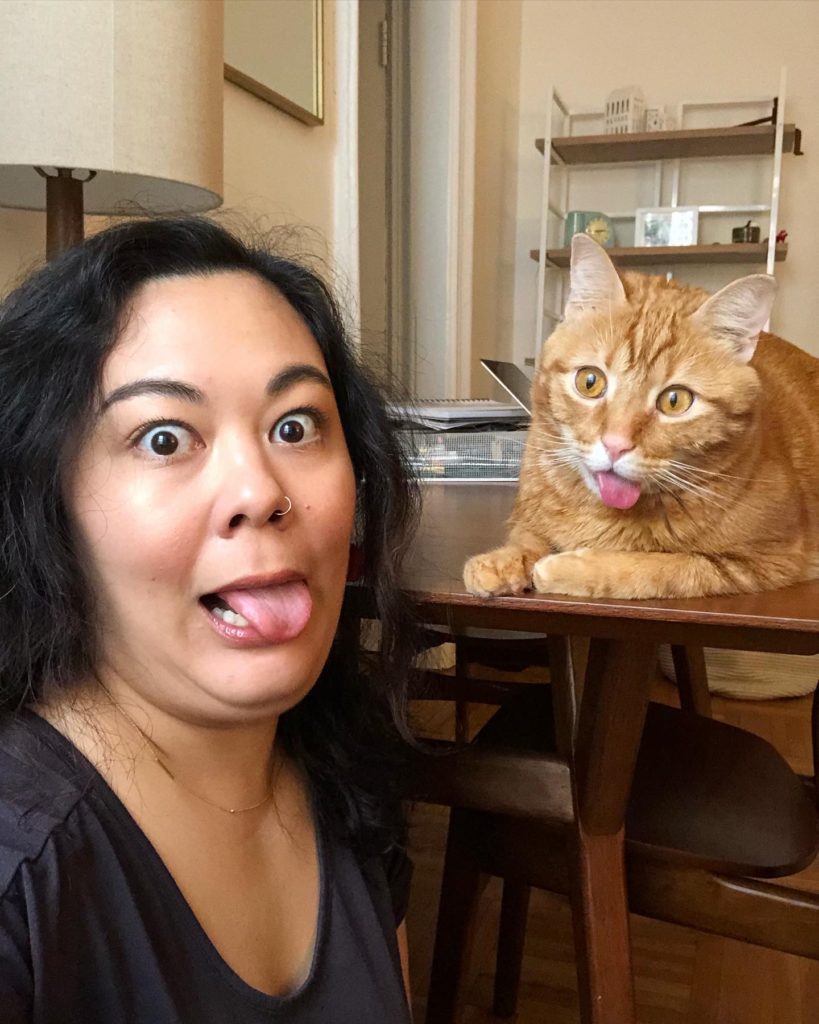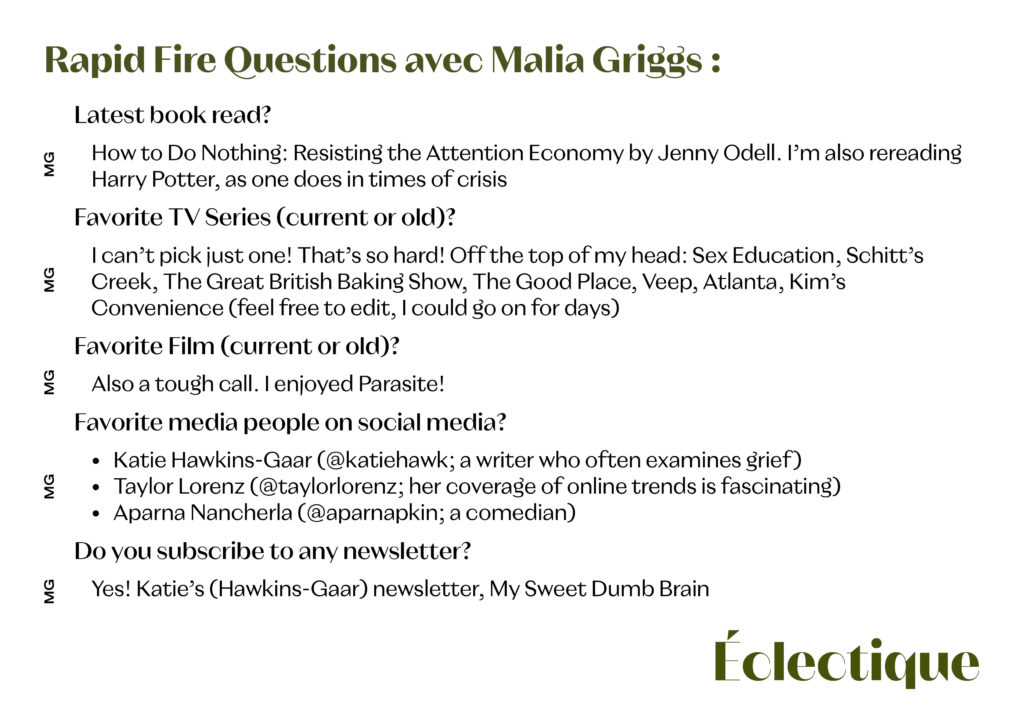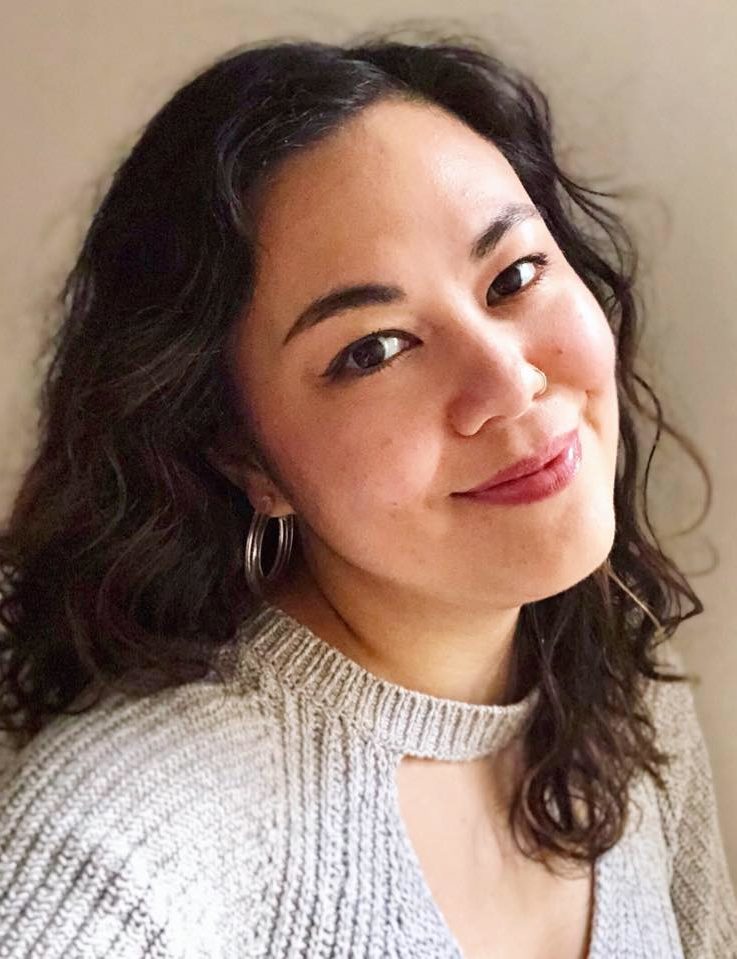Malia Griggs had a job many would covet. And she quit. She used to dissect the news around the world and spend most of her day on social media for The Daily Beast. It sounds like a dream job for any aspiring journalist pursuing a career in the media industry.
But she got caught up by the reality. White supremacists in Charlottesville, Stephen Paddock opened fire on a large crowd in Las Vegas, millions of women sharing their experiences about sexual harassment and assault. Her dream job transformed her dreams into visions of AR-15 and “leering men”.
Before getting caught up in the news cycle, Malia Griggs worked for Comedy Central’s digital department. She also wrote, greatly. She wrote about her, about life, about our time.
Malia was the most notorious virgin to write in Cosmopolitan. She wrote about her experiences, about relationships, on health, epilepsy or on what it means to be biracial in South Carolina.
For Éclectique, Malia candidly accepted to talk about what led her to quit her job, and what life has been like ever since. We talked about American journalism, life in times of quarantine, and about what the future might look like for her.
More than ever, her experience is valuable. Overusing social media has hurt her in a way it could affect many of us, as these uncertain times are pushing us toward using our phones like never before.
Éclectique: Starting with current news, how’s this quarantine going?
Malia Griggs: Very, very surreal. I’m trying to keep up, and it feels like every country is lockdown except for states within the United States. My parents live in the South (in South Carolina) and I can’t see them so I’m nervous. I was looking for jobs and now I think everyone is waiting. But I’m certainly more fortunate than a lot of people. It’s also crazy because ten years ago I was studying abroad in Rome, and now I’m touching base with all of my former teachers and they are all locked down. Hearing from them seems like a preview of my future.
What financial effects does it have for you?
The Senate just passed a law so that every individual taxpayer who makes less than 75,000$ a year will receive a check-up to 1,200$ in the next three weeks. I’ll get that, which is good but mainly I am relying on my parents. I used to feel a little embarrassed admitting that but at this point, I think a lot of people are doing the same. And living in New York, it’s just kind of… it’s impossible.
And politically?
Politically, we are getting very confusing messages from our president. It’s frustrating because it is deepening the problem. For instance, there was a lot of frustration because he could have issued an executive order earlier to push American companies to start producing gloves, masks, medical equipment. New York governor is pushing him that way. If you think of every country like a person, the United States are a teenager.
What does a typical day look like for you now?
This is all catching me at an interesting time. I quit my job in July last year, and I have been spending a lot of time recovering from burnout. Part of my recovery included “staying in place”, and not doing very much because I had been so constantly wrapped up in the news cycle and living in New York constantly seeing people. I had developed epilepsy a couple of years ago. A lot of my time has been filled doing activities that people are now doing as part of their quarantine. I have been painting, cooking, catching up with a lot of friends I had not talked to in a long time. It’s nice that it’s forcing us to be a little more thoughtful but it’s also overwhelming because all of a sudden, every business is online, on video.

Before working at The Daily Beast, you have also worked at Comedy Central for several shows, can you tell me more about it?
I worked at Comedy Central for their Digital Department, where I worked specifically for certain shows (The Colbert Report, The Daily Show with Jon Stewart and @midnight with Chris Hardwick). Comedy Central has tons of different shows but their bread and butter shows are their late-night satirical news. At the time, social media had not been fully integrated into TV shows yet. And the digital social aspect was separate from the show. I would work on their Instagram and Twitter accounts.
When The Colbert Report ended, it was replaced by The Nightly Show with Larry Wilmore, and because there had been communication issues between the departments, I worked on set. I would work with their new digital team. It was new to have a digital team that makes content for the web, which is now fairly standard. Jimmy Fallon has content that is for social media only. Look at the TikToks with SNL celebrities.
What is also interesting is when you look at John Oliver and his show, a lot of his writers and research team are actual journalists. That is where we are with satirical news where it is almost journalism. It’s a lot blurrier. More journalists can also have funny Twitter accounts, can appear or host podcasts. Some write for TV shows while still writing op-eds. Between New York and Los Angeles, there are a lot of crossovers between media and movies.

You were Director of Social Media at The Daily Beast, and you left this job because of a burnout closely bound up with your job? How do you handle your use of social media today?
Leading up to quitting, I knew as soon as I quit, I wanted to turn everything off. I would think: ‘Oh other people can take social breaks but I don’t get to’. Some of my friends don’t have Facebook nor Twitter and I have to. I don’t particularly enjoy Twitter. The only time I have ever enjoyed it has probably been during the Oscars, reading tweets about the ceremony. Live events are kind of exciting to participate in. Otherwise, it is so noisy! It’s just a bunch of people screaming at each other! When I was at work, I would (be on Twitter) because I needed to but otherwise, I would never look at Twitter.
I used to spend a lot of time on Facebook because I found more of a community there when I was younger. But during the elections, it reached a feverish level. Too many opinions, emotions, and I could feel that America was burning out. Now I feel a little of that with Instagram and Twitter.
On Instagram?
Instagram is tough for me. I both enjoy it and find it toxic. Which is the complicated relationship I have with social media. I think it can be a great connecting tool, but I also see the negative impact of it. We’re seeing impacts on people’s health physically and mentally, on our sleep, on our memory, some people develop Carpal Tunnel Syndrome, and I think that this isn’t sustainable. Right now, we are all on Instagram posting “PLEASE save the nurses” memes and “donate” mixed in with “Hi, here is my bread that I’m making during my quarantine”.
Right now, social media feels like something that is bringing us together, but you can be lonely even when being with other people. And I think this will be a time when people realize they have to think about “I need to take care of my mental health”, “I need to do something where I’m not thinking about the news”. Hopefully, we can use social media and the tools we have to connect more meaningfully but also cut back on the habits that negatively impact us.
What a lot of people might feel in the coming weeks while overusing their phone feels like what you went through a year ago?
It’s harder than you think it is. When I quit last year, people thought: “Oh that’s so great, you can go on vacation”. And I would respond: “No! Basically, I’m making a medical leave”. Living in America, there is not much room for this. I took a break for two or three weeks, but it was not enough. It’s an ongoing process to be able to say “It’s okay that you didn’t go outside today or watched TV shows all day”, whatever the things we guilt ourselves for. You have to work on accepting it. And try to feel those mental benefits.
How do you limit yourself on social media?
I have set time limits I’m trying to respect a little more. It’s 45 minutes/day on Instagram, but I ignore it a lot. I’m checking Facebook occasionally but never doing anything on it. I only use it for groups. I also charge my phone in a different room, so I physically restrain myself to go use it.
Your friend joked, calling your last day work “Malia Freedom Day” [she left on July 4th]. Did it feel like freedom?
[Thinking before answering] Hmm. Yes and no… I feel free to move on to the next thing but I don’t feel free in general. I was not free of my exhaustion or my anxieties but freed from the job. There would still be interactions with old coworkers or editors. Not knowing what you are transitioning to gives you anxiety. The unknown is really freaky. People in media are inherently anxious people so I know I am not the only one. I struggled with it but now I have accepted that the new normal is constant change and I’m going to keep moving.
Can you tell me about the process of writing this article explaining why you quit?
The article was something I wanted to do for a long time. I took a while to feel ready to write it. Some articles just marinate and come out easily, other articles are a struggle. That one felt like I had gotten to a place where I felt free enough to write it. Writing it and be able to talk about it and having people talk to me about it and how they are going through something like this feels validating for me too.
How have people talked to you about it?
Some people emailed me or messaged me on Instagram and Facebook. This happened after I wrote earlier articles about relationships and dating where people would reach out to me. I wrote an article about virginity when I was younger so a lot of younger women would reach out to me about their worries. Then for this article, I have had people reaching out telling me their work stories. A lot of them sounded worse than what I went through. One of them told me “I think I’m gonna quit my job thanks to your article” and the day after, told me: “I quit my job! Thank you so much!”. I wanted to tell her “Wait, wait, wait!”. Maybe just give it a week.
Could you apply for a similar job again, while approaching it differently? Or was it a wake-up call?
I think it’s a big challenge for me, now that I’m applying for jobs. When I was younger in my career, when I jumped from jobs to jobs, I did it because I was worried about not having a job. This time, having been someone who led a team, having a better understanding of what the job is actually asking for, I’m applying more selectively. If I can approach it differently this time and have more boundaries, it could be more enjoyable.
What are the challenges of working in social media?
With people working in social media, some people post a lot because they want to be personalities, they want to have followers, and some people don’t at all because they don’t have time to post. Ultimately, you need a mixture of younger people and people with more experience. Social feels like a younger person’s game in many ways. Companies will want to hire younger people because they are savvier and more experienced with platforms. But older people have more experience with changes within the industry. Facebook used to be huge, now it is less so. BuzzFeed used to be big and now BuzzFeed is less so. You used to think that working at certain publications was the coolest thing ever, but now everything is evolving so quickly, and older people know how to sail in the storm because they have been here before.
How much do you credit New York, along with the ultra-competitive media industry, as main factors causing many people to burn out?
I felt pressure when quitting my job, because of some people saying: “Oh well you quit your job, you could write a book about it.” The instinct in New York is to write a book or start a podcast about everything. One characteristic of New York is also that everyone has imposter syndrome. And with people you are friends with you’re thinking: “Oh she is writing this article for The Times or whatever”.
As my therapist would tell me: “What is enough?”
What is next for you, Malia Griggs?
I don’t know… I’m working on some projects. I run a women’s group called WonderWomenProject in New York where I have women come and talk about different topics like finances, cooking, sexual health, or mental health.
I have a better understanding of myself, and this will help me take better decisions now.
This interview has been edited and condensed.
